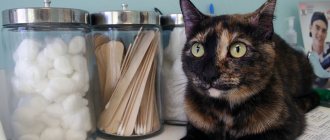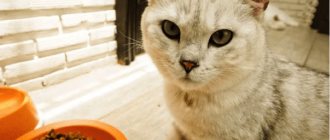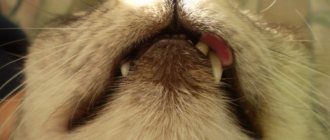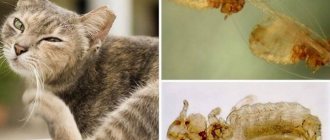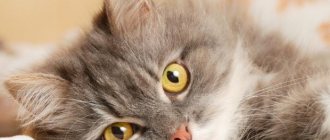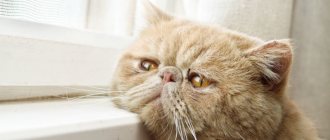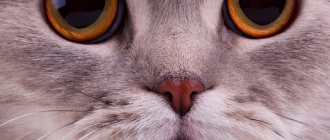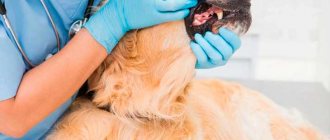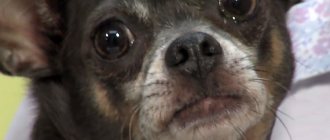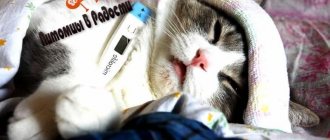How does the gastrointestinal tract of cats work?
Food enters the cat's stomach through the esophagus. Food is digested in the stomach. Cats have very acidic stomach juice. This is necessary to break down the meat and bones of the prey. The acidic environment of the stomach fights pathogenic microbes and parasites.
From the stomach, food enters the duodenum. Here the food mass is mixed with bile, which is produced by the liver, and fluid, which is produced by the pancreas. These fluids contain enzymes that break down proteins, carbohydrates and fats, and also neutralize stomach acid.
After this, the food mass passes through the small intestine. The walls of the small intestine absorb nutrients, vitamins and minerals. This way, everything necessary for the cats’ health gets into the bloodstream.
The food mass then enters the large intestine. The body absorbs remaining nutrients and excess fluid. After some time, undigested parts of food are eliminated from the body.
The gastrointestinal microflora helps cats break down food and protect themselves from harmful bacteria. The intestines of cats are inhabited by many beneficial bacteria, which ensure the health of the pets' gastrointestinal tract.
Structure of the gastrointestinal tract of cats
Causes
Inflammatory processes in the digestive canal occur when exposed to the following factors:
- Non-contagious.
- Contagious.
Gluttony causes diseases of the digestive system
. Recommended articles:
- Smecta for cats with diarrhea
- Why are cats overweight?
Non-contagious
They arise as a result of congenital predisposition and the following dietary errors:
- Poor quality products.
- Feeding food that is unusual for a cat.
- Overfeeding.
- Water unsuitable for drinking.
- Traumatization from swallowed small fish bones.
- Ingestion of poisonous plants or chemicals into the alimentary tract.
- Eating mice poisoned during deratization.
- Drug toxicosis.
- Allergic intolerance to food ingredients.
- Intestinal volvulus.
- Hormonal disorders.
- Neoplasms.
Poisoned mouse
Contagious
Occurs with helminthiasis, panleukopenia, coronavirus enteritis, inflammation of the cat’s intestines of bacterial etiology
How do gastrointestinal diseases occur in cats?
Gastrointestinal diseases in cats can occur due to poisoning, injury, infection or parasites. But often the unobvious cause of gastrointestinal diseases is a violation of the intestinal microflora.
Normally, in the gastrointestinal tract of cats, all the necessary beneficial bacteria are contained in the required quantity, in balance. Then the cat’s body remains healthy. But if a cat eats food that is not biologically appropriate, takes medications, or eats something that contains toxins, the gastrointestinal microflora is disrupted. An imbalance arises.
If there are more harmful bacteria than beneficial ones, problems with digestion and more arise.
Research shows that cats that eat a healthy diet have a more diverse and stable gastrointestinal microflora than cats that eat commercial food.
Commercial foods often contain a lot of carbohydrates—much more than cats need. When cats eat commercial food for a long time, the microflora of their gastrointestinal tract changes. The number of bacteria that break down carbohydrates increases. Some of these bacteria cause inflammation of the gastrointestinal tract.
The normal microflora of the stomach protects the lining of the small intestine. Thanks to this, nutrients are absorbed gradually, and harmful microorganisms do not enter the blood. When the microflora of the stomach is disturbed, pathogenic bacteria easily penetrate the blood and affect not only the stomach, but also other organs. Cats appear
- allergies,
- intestinal inflammation,
- constipation,
- diarrhea,
- disorders of the liver,
- diabetes,
- renal failure, etc.
If your pet suffers from allergies, it may be due to an imbalance in the intestinal microflora. In this case, you need to restore healthy microflora, and a species-typical diet will help with this.
When the intestinal microflora is disturbed, the walls of the small intestine become loose. Because of this, it is easy for pathogenic bacteria to penetrate into the blood
Overview of Treatment for Digestive System Disorders
Specific disorders and their treatments are described later in this chapter; however, some general principles are listed in this section. Addressing the cause of disease is the primary goal of veterinary treatment, but most treatment often targets signs of disease and aims to relieve pain, correct abnormalities, and allow healing to occur.
Treating the cause of the disease may include medications that kill bacteria or parasites, antidotes for poisons, or surgery to correct defects or misalignments.
The use of drugs to correct diarrhea or constipation depends on the specific case. Although such medications may seem like a logical choice, they are not beneficial in every situation. For example, diarrhea may actually be a defense mechanism for an animal, helping it eliminate harmful organisms and their toxins. In addition, available medications may not always provide consistent results.
Replenishment of fluids and salts is necessary when the animal is at risk of dehydration, such as from excessive vomiting or diarrhea.
Surgical relief of bloating may be necessary if the gastrointestinal tract has become blocked or swollen with gas, liquid, or food.
Pain relief is sometimes provided. However, a cat that is given pain medication should be closely monitored to ensure that the pain medication does not mask a condition that is getting worse.
Treatment and control of infectious diseases
Bacterial and parasitic diseases of the digestive system are often treated with medications designed to kill the infecting organisms. Currently, there are no special drugs for the treatment of viral diseases. Antibiotics (drugs effective against bacteria) are usually given daily by mouth for several days until recovery occurs, although their effectiveness in treating digestive system diseases is still uncertain and long-term use may be harmful. Antibiotics may be given by injection when septicemia (blood infection) is obvious or likely to occur. Your veterinarian will decide whether to prescribe an antibacterial drug based on suspicion of disease, likelihood of benefit, previous results, and cost of treatment.
Advances in understanding the life cycles of parasites, coupled with the discovery of effective antiparasitic drugs, have made successful treatment and control of gastrointestinal parasites possible. The response to treatment is usually rapid, and a single treatment is often all that is required, unless re-infection occurs or the damage caused by the parasites is particularly severe.
Control of digestive diseases and parasites depends on proper sanitation and hygiene. This is achieved primarily by providing adequate space for your cat and regularly cleaning her living quarters and litter box. Additionally, adequate food and housing will minimize stress for your cat and help her stay healthy.
Common gastrointestinal diseases in cats
The main symptoms for various gastrointestinal diseases in cats are similar:
- increased salivation,
- diarrhea,
- constipation,
- vomit,
- loss of appetite,
- bloating,
- problems with bowel movements.
Inflammation of the large intestine (colitis)
Symptoms: The cat has difficulty defecating, and the stool is more runny than usual. Sometimes blood is visible in the stool.
Colitis can be caused by poisoning, injury, imbalance of intestinal microflora, and sometimes even stress. A cat with symptoms of colitis must be taken to the veterinarian to establish an accurate diagnosis and cause of the disease. Treatment will depend on the cause of the disease.
Constipation
Symptoms: the cat has difficulty defecating, the feces are very dry and hard. Some cats lose their appetite and become lethargic.
Constipation occurs in cats that eat very little. In this case, little food mass passes through the gastrointestinal tract, which causes difficulties in emptying the stomach. Constipation can also be caused by a lack of fluid in food.
Constipation can be caused by more than just diet. Sometimes constipation is associated with physiological reasons, for example, due to enlarged lymph nodes or tumors. To rule out these causes, you need to show your pet to a veterinarian.
If your doctor determines that your cat is constipated due to diet, first make sure your cat is getting the right amount of fluids. Adding a small amount of vegetables to your diet will also help cope with constipation: boiled pumpkin, green beans or carrots.
Intestinal inflammation
Symptoms: vomiting, pain in the stomach.
The cause of inflammation can be an imbalance in the gastric microflora, poisoning, injury, parasites, or low immunity.
A veterinarian will help determine the exact cause of inflammation. If the cause of inflammation is in the diet, it will have to be changed. The most suitable food for cats is biologically appropriate. Such a diet will help cope with gastrointestinal problems and prevent other diseases.
Intestinal malabsorption syndrome
With this syndrome, cats' intestines do not absorb nutrients well. This is caused by a lack of certain enzymes in the body.
Symptoms: weight loss, regular diarrhea, increased or decreased appetite. Sometimes the syndrome causes virtually no symptoms and may remain unobvious for a long time.
Diagnosing intestinal malabsorption syndrome is difficult because the symptoms of the syndrome are similar to those of other gastrointestinal diseases. In the case of the syndrome, a change in diet is one of the prerequisites for recovery.
Intestinal diseases in kittens
Due to their still weak immunity, kittens under the age of 8–9 months are especially susceptible to intestinal diseases. Gastrointestinal disorders due to stress or a change in diet are also common in kittens. Infectious and invasive intestinal diseases can cause the death of a kitten, therefore, even with the most minor ailment, sometimes expressed only in a decrease in activity, it is recommended to immediately contact a specialist to examine the animal, make a diagnosis and provide assistance.
To treat intestinal diseases in kittens, drugs are selected whose side effects are minimized.
How does a species-typical diet help with gastrointestinal diseases?
Biologically appropriate cat food includes raw meat, organ meats, liver, small amounts of vegetables and bone. These are the main components of a healthy diet. The cat's body is designed to obtain the necessary nutrients and energy from animal protein. It is easily digestible and does not burden the kidneys, liver and other organs. A healthy diet should contain about 70%-75% liquid.
Gastrointestinal diseases in cats can be caused by disturbances in the microflora of the stomach. A varied, species-typical diet will help keep the microflora healthy. A healthy gastrointestinal environment protects cats from pathogenic bacteria and parasites and ensures stable, strong immunity.
A healthy diet is not only a means to combat gastrointestinal problems. Species-typical nutrition is an excellent and affordable way to prevent gastrointestinal diseases in cats. SUPERPET will help provide your cat with a biologically appropriate diet. The composition contains only natural ingredients. SUPERPET diets contain the required amount of fluid, enough taurine and all the vitamins and minerals needed for health. The food is stored and delivered frozen, so you can be sure that there are no preservatives in it. Help your pet eat right - this will keep him healthy and ensure a long and happy life.
Did you like the article? Share with your friends:
Diagnostics
Taking an anamnesis is important. The doctor needs detailed information about the age of the animal, when and with what the cat was vaccinated and dewormed. Information about the composition of the diet and the date of onset of the first pathological symptoms may be required. If a fellinologist has several animals, what is their health? Are all of them sick or just one?
The most characteristic signs of intestinal inflammation are blood or mucus in the feces, as well as diarrhea and vomiting over a significant period of time. When examining, pay attention to thinness, the intestines become thickened. Laboratory tests are not informative. As prescribed by the doctor, a biopsy, bacterial culture of feces, a test to detect protozoal infestation, and a test diet are performed.
